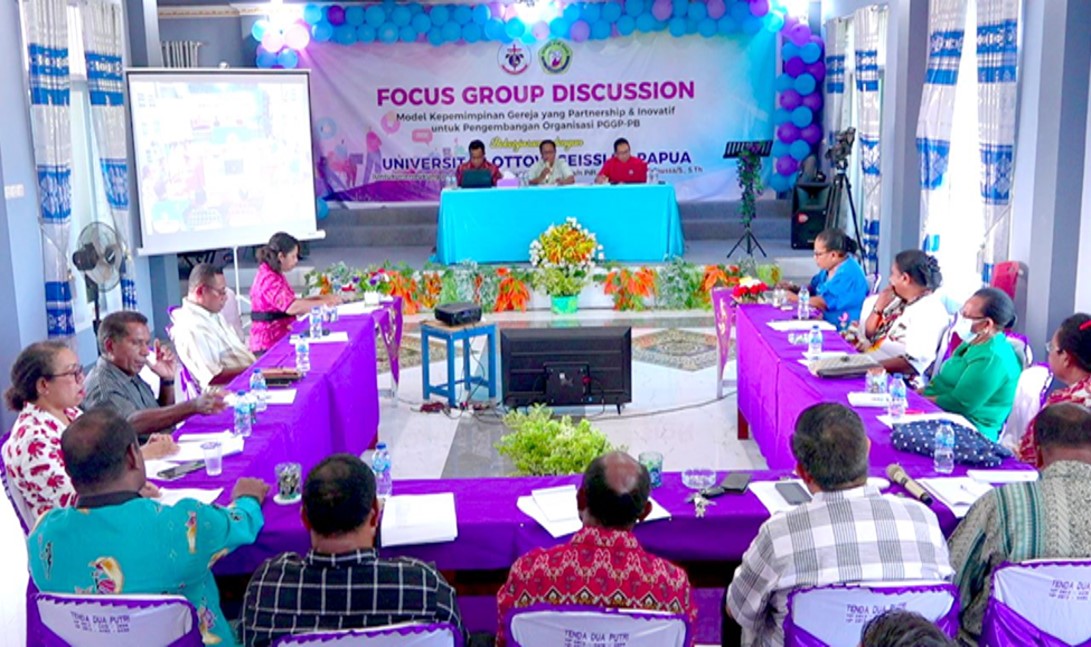MODEL KEPEMIMPINAN GEREJA YANG PARTNERSHIP DAN INOVATIF DALAM PENGEMBANGAN ORGANISASI PERSEKUTUAN GEREJA-GEREJA PAPUA DI PAPUA BARAT
DOI:
https://doi.org/10.47457/jps.v5i1.441Keywords:
church, innovative, leadership, partnershipAbstract
The movement of an organization cannot be separated from the role of a leader. Still, an important question is what kind of leadership model is suitable to be applied in an oikoum Church organization, in this case, the Papuan Churches Association in West Papua Province. Indeed, what kind of leadership model or style is suitable for developing a complex and pluralistic religious organization such as PGGP West Papua? Can the current leadership model answer the various fundamental problems the West Papua PGGP organization faces? FGD activities get input from participants who are very enthusiastic about participating in this activity. These inputs benefit the future development of West Papua PGGP by considering the strengths, weaknesses, opportunities, and threats. The results of these inputs will provide input for the West Papua PGGP management to carry out appropriate strategies to develop the West Papua PGGP organization in the future in entering the current era of globalization.
Downloads
References
Benny Andreson Situmorang, Kristina L Silalahi. 2019. “Pengaruh Focus Group Discussion Tentang Pelaksanaan Uji Kompetensi Terhadap Tingkat Kecemasan Mahasiswa.” Jumantik 4, no. 2.
Christian, Ferdinandus. 2018. “Leadership and Motivation To Performance Employee in Papua Province.” International Journal of Economics Management and Social Science 1, no. 1: 17–23. https://doi.org/https://doi.org/10.32484/ijemss.v1i1.4.
Emilia Puspitasari SugiyantoMulyono. 2022. Focus Grup Discustion (Fgd) Pelatihan Pemanfaatan Teknologi Pada Keluarga Dalam Perawatan Pasien Paliatif Di Yayasan Izi Semarang. Semarang: Uniersitas Widya Husada.
Endah Suryani, Ferdinandus Christian, and Mohammad Imam Farisi. 2021. “Do Participatory Leadership Style, Motivation, and Work Environment Affect Employee Performance? Lessons from Local Organization in An Emerging Country.” Britain International of Humanities and Social Sciences (BIoHS) Journal 3, no. 2: 316–31. https://doi.org/10.33258/biohs.v3i2.453.
Mashuril Anwar, Mashuril Anwar, Eko Rahardjo Eko Rahardjo, Firganefi Firganefi, Maya Shafira Maya Shafira, Rini Fathonah Rini Fathonah, and Dona Raisa Monica Dona Raisa Monica. 2020. “F Fgd Dan Edukasi Tentang Upaya Pencegahan Terhadap Kekerasan Seksual Dalam Rumah Tangga.” Dinamisia : Jurnal Pengabdian Kepada Masyarakat 3, no. 2: 198–204. https://doi.org/10.31849/dinamisia.v3i2.3271.
Meho, Henderjeta, and Ferdinandus Christian. 2019. “Analysis of Government Employee Performance in Keerom Regency, Papua, Indonesia.” Journal of Economics, Business, and Government Challenges 2, no. 2: 128–35. https://doi.org/10.33005/ebgc.v2i2.79.
Rangkuti, F. 2014. Analisis SWOT Teknik Membedah Kasus Bisnis. Jakarta: PT. Gramedia Pustaka Utama.
Shantini Rumbi, Ferdinandus Christian, and Suparti. 2021. “The Effects of Motivation, Leadership, and Work Environment on Employee’s Performance: A Case of Local Government Agency in Emerging Country.” Britain International of Humanities and Social Sciences (BIoHS) Journal 3, no. 2: 347–60. https://doi.org/10.33258/biohs.v3i2.455.
Vardhani, Nabilla Kusuma, and Agnes Siwi Purwaning Tyas. 2019. “Strategi Komunikasi Dalam Interaksi Dengan Mahasiswa Pertukaran Asing.” Jurnal Gama Societa 2, no. 1: 9. https://doi.org/10.22146/jgs.40424.
Waluyati, Made. 2020. “Penerapan Fokus Group Discussian (FGD) Untuk Meningkatkan Kemampuan Memanfaatkan Lingkungan Sebagai Sumber Belajar.” Jurnal Edutech Undiksha 8, no. 1: 80. https://doi.org/10.23887/jeu.v8i1.27089.

Downloads
Published
How to Cite
Issue
Section
License
Copyright (c) 2024 Jurnal PKM Setiadharma

This work is licensed under a Creative Commons Attribution-ShareAlike 4.0 International License.
Authors who publish with this journal agree to the following terms:
- Authors retain copyright and grant the journal right of first publication with the work simultaneously licensed under a Creative Commons Attribution License that allows others to share the work with an acknowledgement of the work's authorship and initial publication in this journal.
- Authors are able to enter into separate, additional contractual arrangements for the non-exclusive distribution of the journal's published version of the work (e.g., post it to an institutional repository or publish it in a book), with an acknowledgement of its initial publication in this journal.
- Authors are permitted and encouraged to post their work online (e.g., in institutional repositories or on their website) prior to and during the submission process, as it can lead to productive exchanges, as well as earlier and greater citation of published work (See The Effect of Open Access).











